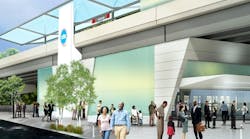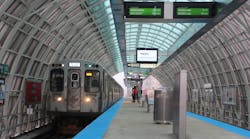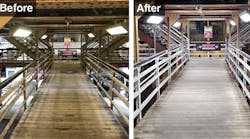Chicago Transit Board approves CTA’s 2024 operating budget
The Chicago Transit Board has approved the Chicago Transit Authority’s (CTA) Fiscal Year (FY) 2024 $1.99 billion operating budget. The budget will keep all fares at current levels, maintain the delivery of existing bus and rail services and anticipates adding more service to meet growing ridership demand.
“I want to thank all our riders who took the time to share their comments and feedback as part of our budget hearing process; your words are not lost on us and will be top of mind as we forge ahead and continue making improvements systemwide during the next year,” said CTA President Dorval R. Carter, Jr. “We are committed to adding more service in the year ahead while also continuing to make the best decisions and investments that provide our riders with the highest levels of service, customer comfort, modernization and equity.”
The proposed spending budget reflects a 9.2 percent increase (or $168.2 million) over the FY 23 budget and supports CTA’s ongoing workforce initiatives for hiring and retaining key operations personnel while also introducing several new measures that will help improve the overall customer experience with enhanced security and improved Ventra fare system features, including a new ChatBot for improved customer service, ongoing work with other Chicago-based transit agencies in Metra, Pace and RTA of Northeastern Illinois to deliver innovative fare products, along with a new dedicated program that will provide pre-loaded Ventra Cards to victims and survivors of domestic abuse.
CTA says the continued strengthening of its workforce is critical to further improving the delivery of its services. In 2023, the authority made tremendous progress toward addressing the issue, hosting seven job fairs that attracted more than 3,000 potential employees while hiring hundreds of new workers into a variety of positions. As a result of CTA’s ongoing aggressive recruiting efforts, it has already surpassed its goal of hiring 700 new bus operators in 2023 and anticipates hiring more than 900 bus operators by the end of the year.
CTA is also on track to hire approximately 100 bus mechanics in 2023, which is more than double the normal rate. On the rail side, almost 100 flaggers will have been trained and transitioned into rail operator positions by the end of 2023, which CTA notes is significantly more rail operators trained than the number of rail operators historically trained in a year. The authority is projecting to hire more than 2,000 new employees for the current year, also far exceeding the 1,200 annual hiring norms.
The CTA’s 2024-2028 Capital Improvement Program—which is separate from the agency’s operating budget—calls for $3.61 billion in projects over the next five years. This budget reflects CTA’s ongoing commitment towards the modernization and improvement of its physical infrastructure—tracks, rail stations, buses and trains, facilities and technologies. Among the many important investments is the Red Line Extension, which will extend the CTA’s busiest rail line to the southern city limits and will provide greatly improved transit access and connectivity to the Far South Side of Chicago.
Other capital projects to continue or begin in 2024 include:
- All Stations Accessibility Program (ASAP): A total of 14 rail stations are now fully -funded for future accessibility modernization construction work. Of these stations, five are currently under construction, three are in design and five are in various stages of planning. In addition to station improvements, CTA has $37 million in funding for elevator replacements and/or modernizations of existing elevators across the system-up to 16 elevators.
- Bus system electrification: Funds allocated for the full -electrification of the 103rd Garage, plus an allocation of funding for the ongoing Chicago Garage implementation.
- Rail fleet modernization: Increased production of the 7000-series–CTA’s newest generation of railcars, plus ongoing quarter-life overhauls of the agency’s 5000-series.
- Refresh & Renew: Expansion of this annual facilities improvement program to include more CTA employee workplaces while continuing to focus on rail station repairs and enhancements.






